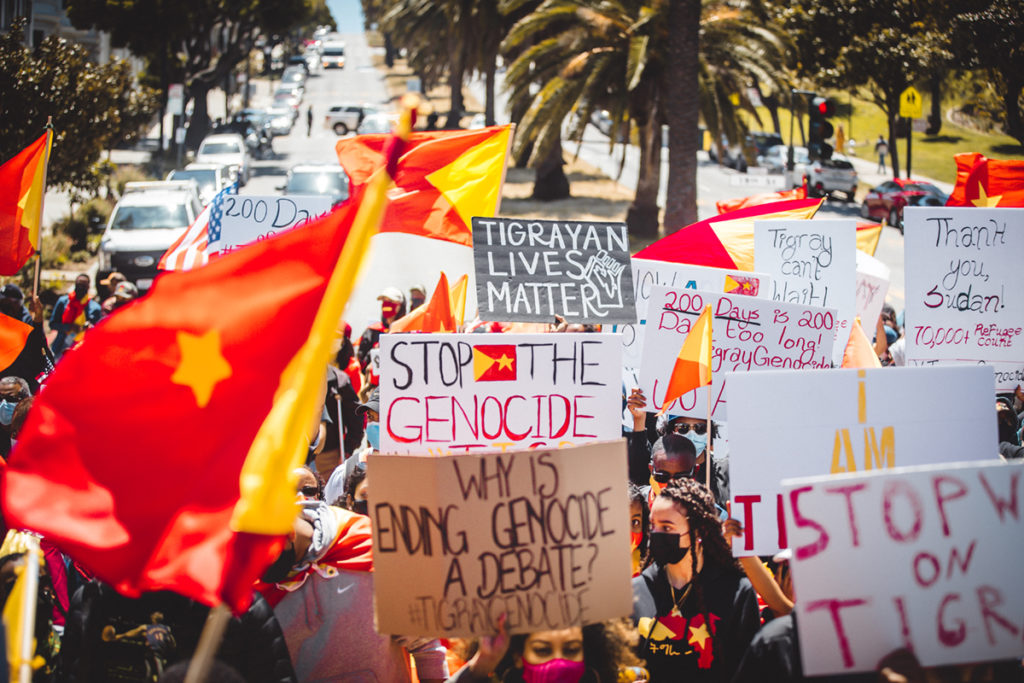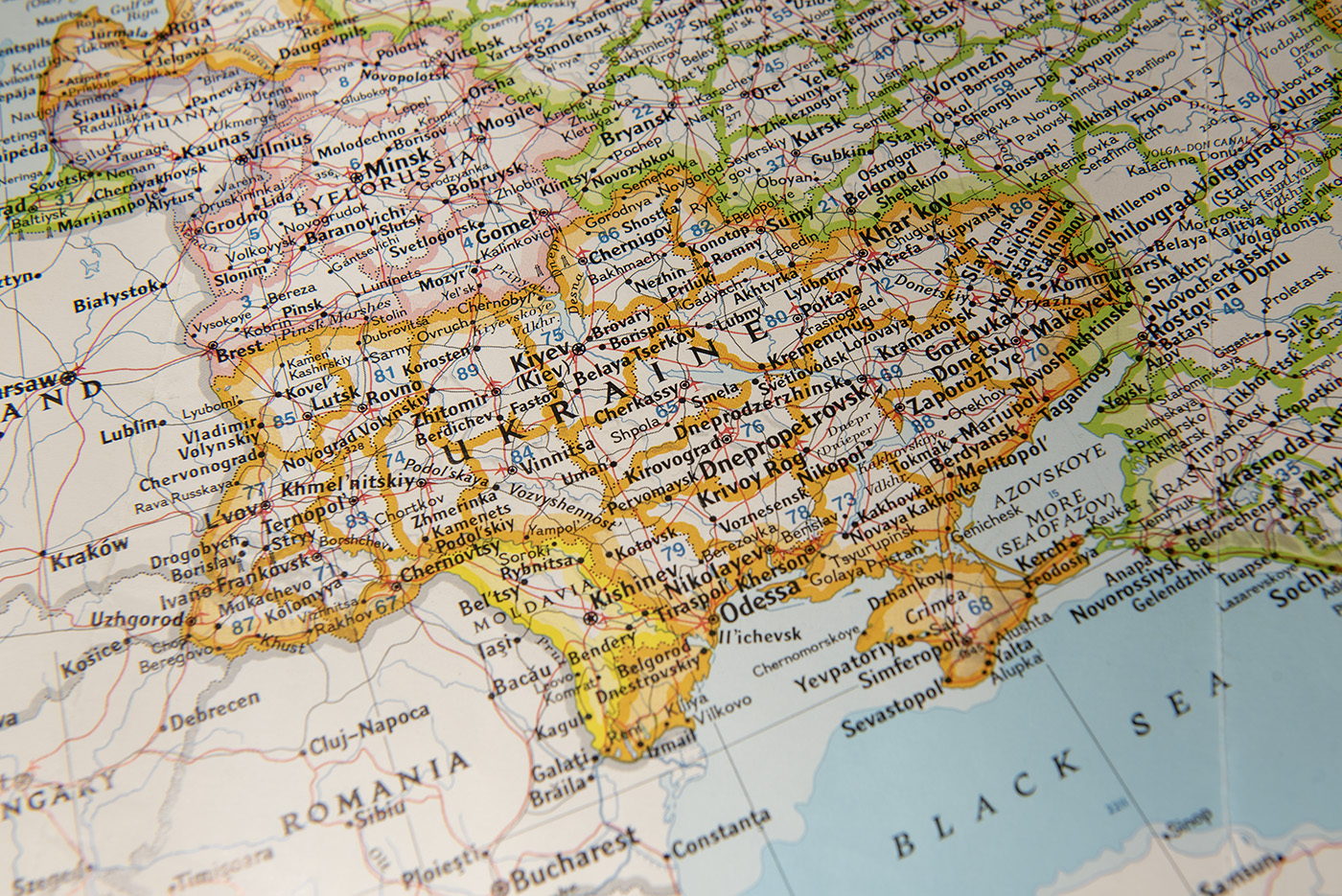UCLA alumni call for awareness, aid for Tigrayans in Ethiopia

Tigray (pictured) on a map. UCLA alumni are calling for aid and relief in Tigray, the northernmost region of Ethiopia. (Christine Kao/Daily Bruin staff)
This post was updated August 19 at 10:34 p.m.
Feven Girmay has not heard from her grandmother in over 10 months.
Girmay, a political science alumnus of UCLA, has family living in Tigray, the northernmost region of Ethiopia.
For many members of the Tigrayan diaspora such as Girmay, communication with family members in Ethiopia has become difficult. The federal government has shut off much of the telecommunications, electricity and banking services in the area as part of a larger civil war against the Tigrayan people, according to Daniel Hagos, a history alumnus of UCLA who has been organizing alongside other members of the Tigrayan diaspora for humanitarian relief in Tigray.
The beginnings of the war trace back to September 2020 when the federal government of Ethiopia canceled regional elections, according to The New York Times. While the government claimed it was due to the COVID-19 pandemic, Hagos said it was actually an attempt to consolidate its power. But Tigray, following the Constitution of Ethiopia – which allows regions to hold elections if they can do so safely – held elections anyway, he said.
In November 2020, local Tigrayan forces seized control of a federal military base in Tigray, alleging that this was a defensive move against federal forces planning to attack the region because they held elections, according to The New York Times.
Soon after, Ethiopian prime minister Abiy Ahmed ordered the invasion of Tigray, according to BBC News. Since then, Girmay said she has been unable to stay in consistent contact with family in the area and has even lost some family members who lived there.

As a result of the war, over half a million people have died in Tigray, according to The Globe and Mail.
Girmay added that civilian casualties are not merely from violence but also from other effects of the invasion, including famine and lack of access to medications such as insulin. According to the Associated Press, nearly 1 million people in the region are facing famine.
Hagos said the government’s military forces are also enacting widespread sexual violence against women in Tigray.
“This is strictly under the pretext of, ‘Well, you shouldn’t have held this regional election.’ But the reality is, there was furious ethnic hate towards the people of Tigray,” he said. “And it was used as an opportunity to lay waste on the people.”
Tigrayans make up about 7% of Ethiopia’s population – a minority compared to the two largest ethnic groups, the Oromo and the Amhara, which make up over 60% combined, according to The New York Times.
According to the Associated Press, the United States removed Ethiopia from a trade program that provides some countries duty-free access to the U.S. However, the United Nations is still sending aid to Ethiopia, Girmay added.
“If the U.S. was to impose widespread sanctions on Ethiopia, that would force the Ethiopian government, that would force their hand to want to end this war,” Girmay said. “Because Ethiopia, to a large extent, … has become somewhat dependent on aid.”
Girmay said students can push for awareness of and action against the situation in Tigray by understanding what is going on and reaching out to their local political offices to call for legislation related to foreign aid. One piece of federal legislation yet to be voted on in the House of Representatives, House Resolution 6600, would require President Joe Biden to impose sanctions on Ethiopian officials who have committed human rights violations and suspend certain U.S. foreign assistance to the country, according to the Congressional Budget Office.

Congressman Brad Sherman, also a UCLA alumnus and the U.S. representative for California’s 30th Congressional District, co-sponsored this measure. He said in an emailed statement he has advocated for the U.S. to take every available action to get food aid to the approximately 1 million people facing famine and end the human rights abuses occurring in Tigray.
“What’s unfolding in Ethiopia is heartbreaking and has all the makings of a genocide,” Sherman said in the statement. “The United States and the international community possess, not only a moral obligation, but the ability to help bring an immediate end to this heartbreaking conflict.”
The U.S. State Department has characterized the violence in Tigray as ethnic cleansing. However, Hagos said the department has yet to announce any determination of genocide despite widespread documentation of violence.
Girmay said the reason for a lack of news coverage on Tigray stems from the conflict being intrastate as well as the effects of a biased racial narrative that Africa is always at war. In comparison to the United States’ quick response to the war in Ukraine, the U.S. government has been slow to help Tigrayans, Hagos said.
Reports of violence continue in Ethiopia, according to an August situation report from the U.N. The report noted that a lack of resources and telecommunication services still persists in northern Ethiopia.
Hagos said it has been difficult to fear for the safety of his family.
“Essentially, I’m waiting just like everyone else in the diaspora to hear back about, ‘Hey, did (my) family survive this onslaught?’ … Or, if they fortunately survived, did they starve to death because of this?” Hagos added. “Dealing with that day to day, … it’s a really difficult challenge.”





